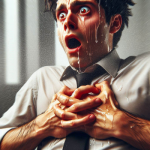A phobia is an abnormally high level of irrational apprehension about a specific event or behaviour.
There are numerous phobias in our culture.
Arachnophobia (fear of spiders) and Claustrophobia (fear of heights) are two of the most common phobias.
Many people with a tendency to blush suffer from erythrophobia, which is the fear of blushing.
 People who have trouble blushing are more likely to suffer from Erythrophobia, which is a less well-known fear of light.
People who have trouble blushing are more likely to suffer from Erythrophobia, which is a less well-known fear of light.
It’s not uncommon for people who are particularly sensitive to the opinions and perceptions of others to blush when confronted with the possibility that others are observing them or making judgments about their appearance.
Physical blushing is a response to emotional thoughts associated with overly focusing on the reactions of others, which can lead to excessive blushing.
Because they worry about how they appear to others, problem blushers blush when they’re in situations where they’re likely to be judged.
Erythrophobia occurs when people with a problem with blushing become overly concerned about how they appear to others when they are blushing.
People who suffer from Erythrophobia are afraid of how their blushing will appear to others.
Whether or not they are blushing and how their skin looks to others becomes a major concern for them.
This phobia is not only irrational, but it also feeds on itself.
When people worry about how they appear to others when they blush, they actually end up blushing more.
Having a problem with blushing can lead to a vicious cycle.
One’s tendency to blush worsens with increasing levels of blushing anxiety.
Erythrophobia, the fear of blushing, may appear silly and difficult to understand to people who have never had a problem with blushing.
Erythrophobia, on the other hand, is no joke.
Erythrophobia is a real and serious problem for those who suffer from it.
Excessive blushing, coupled with an irrational fear of blushing, can have an impact on every aspect of a person’s day to day life.
This can lead to the development of additional social phobias for those with Erythrophobic reactions.
They’re more likely to feel hopeless and avoid social situations altogether if that’s the case.
People who suffer from Erythrophobia are more likely to suffer from depressive symptoms.
The general public will hopefully gain a better understanding of the seriousness of
Erythrophobia and the problem of blushing if this problem is made more widely known.
People who experience problem blushing may be able to overcome their self-consciousness as the severity of their condition is better understood.





